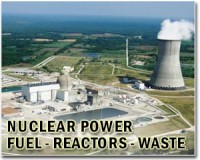 |
Frankfurt (AFP) March 23, 2011 Chancellor Angela Merkel said Wednesday that the sooner Germany abandoned nuclear power the better, but stressed the energy source was still needed as a stopgap technology for Europe's biggest economy. The lesson Germany should learn from the nuclear crisis in Japan is "the earlier the exit, the better. Nuclear technology is a transitory technology", Merkel told a financial conference here. Merkel also voiced support for a European Union decision taken last week to submit the 143 nuclear reactors in the bloc to stress tests aimed at ensuring they could resist earthquakes, tsunamis and terrorist attacks. "The debate must take place on a rational basis," added the German leader, a former environment minister. In the wake of the Japanese crisis, Merkel's centre-right coalition has decided on a three-month moratorium on plans approved last year to postpone the closing of nuclear plants by more than a decade, until the mid-2030s. She also ordered the temporary shutdown of Germany's seven oldest nuclear reactors while authorities conduct safety probes. At least one was mothballed for good. Opposition politicians, particularly those from the Green party, slammed the moves as electioneering ahead of a key state election this weekend in Baden-Wuerttemberg, which is home to four nuclear reactors. Merkel vowed last week that Germany would accelerate the switch to renewable energy, calling for a "measured exit" from nuclear power in light of the Japanese crisis. "We want to reach the age of renewable energy as soon as possible. That is our goal," the chancellor told parliament. Polls consistently show that nuclear power is unpopular in Germany and protests against it regularly attract large crowds. A survey published in mass circulation Bild daily showed 70 percent of the 1,122 voters surveyed approved of the decision to halt the reactors temporarily. But 81 percent of respondents said they did not believe "credible" Merkel's apparent U-turn on nuclear policy. On March 14, more than 100,000 people turned out to call for the closure of the country's nuclear facilities across more than 450 towns and cities, according to anti-nuclear campaigners. In a separate protest three days earlier, tens of thousands formed a 45-kilometre (28-mile) human chain between a nuclear plant and Stuttgart. The demo was planned beforehand, but events in Japan swelled numbers. It took place in Baden-Wuerttemberg, where on Sunday, Merkel's Christian Democrats face losing power after 58 years in charge. Meanwhile, Italy declared on Wednesday a one-year moratorium on the country's nuclear programme at a cabinet meeting owing to the crisis in Japan, government officials told AFP in Rome. And across Asia, supermarkets were selling fewer Japanese products and restaurants in "Little Tokyo" districts were suffering as fears rise that Japan's food chain has been dangerously tainted with radiation. Hong Kong became the first place in Asia to impose a ban on certain Japanese food imports after the United States said it was barring dairy products and fresh produce from regions around the stricken nuclear plant.
Share This Article With Planet Earth
Related Links Nuclear Power News - Nuclear Science, Nuclear Technology Powering The World in the 21st Century at Energy-Daily.com
 Russia makes lower offer for Mantra uranium
Russia makes lower offer for Mantra uraniumSydney (AFP) March 23, 2011 A subsidiary of Russia's atomic energy agency has used Japan's nuclear crisis to slash its planned takeover price for Australian uranium miner Mantra Resources by 12 percent. Last week, the Russian Federal Atomic Agency's ARMZ uranium producer withdrew its Aus$8 ($8.07) a share offer because of the problems at Japan's Fukushima nuclear plant, saying they would affect Mantra's business. I ... read more |
|
| The content herein, unless otherwise known to be public domain, are Copyright 1995-2010 - SpaceDaily. AFP and UPI Wire Stories are copyright Agence France-Presse and United Press International. ESA Portal Reports are copyright European Space Agency. All NASA sourced material is public domain. Additional copyrights may apply in whole or part to other bona fide parties. Advertising does not imply endorsement,agreement or approval of any opinions, statements or information provided by SpaceDaily on any Web page published or hosted by SpaceDaily. Privacy Statement |